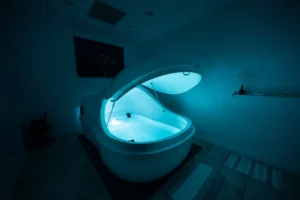In an age where mental health takes center stage, the quest for innovative, non-invasive therapies is paramount. Enter float therapy – a beacon of serenity amidst life’s chaos, offering a unique sanctuary for the mind. Delve into the scientific depths and research revelations that underscore float therapy as a potent ally in enhancing mental health, guiding you through the turbulence of psychological distress.
The Essence of Float Therapy in Mental Wellness
Float therapy, also known as sensory deprivation therapy, immerses individuals in a tank filled with skin-temperature saline solution, minimizing external sensory input. This environment fosters profound relaxation and introspection, nurturing mental healing and exploration.

The Science Behind Serenity
Central to float therapy’s mental health benefits is its capacity to induce deep relaxation, countering chronic stress and anxiety. Research published in the American Journal of Psychology highlights how float therapy significantly reduces stress and anxiety levels, offering respite even for those with diagnosed anxiety disorders.
Float Therapy and Depression
Studies in neuropsychology unveil float therapy’s potential to alleviate symptoms of depression. By facilitating weightlessness and sensory reduction, float therapy sessions enhance mood, boost well-being, and alleviate symptoms of depression.
PTSD and Sensory Deprivation Healing
For those grappling with PTSD, float therapy emerges as a promising treatment avenue. Research indicates that the tank’s isolation environment empowers individuals to confront and process traumatic emotions, diminishing the frequency and intensity of PTSD symptoms.
The Neurological Pathway to Peace
Float therapy’s impact on mental health extends to brain wave patterns. The sensory-deprived tank prompts a shift from beta waves, associated with stress, to alpha and theta waves, fostering relaxation and creativity – bolstering immediate relaxation and long-term mental resilience.
Empirical Evidence and Personal Accounts
Quantitative research and personal testimonials underscore float therapy’s efficacy. Participants report profound peace, clarity, and emotional release post-session, with sustained improvements in mental health conditions.
Conclusion: A Quiet Revolution in Mental Health Care
As research burgeons, float therapy garners recognition as a vital component of mental health treatment. Its ability to provide respite from daily sensory overload, coupled with therapeutic effects on stress, anxiety, depression, and PTSD, positions float therapy as a promising practice in mental wellness. Embrace the tranquility of the float tank and embark on a journey of self-discovery and healing, navigating the mind’s waters towards improved mental health – a testament to the power of stillness in a world in constant motion.






